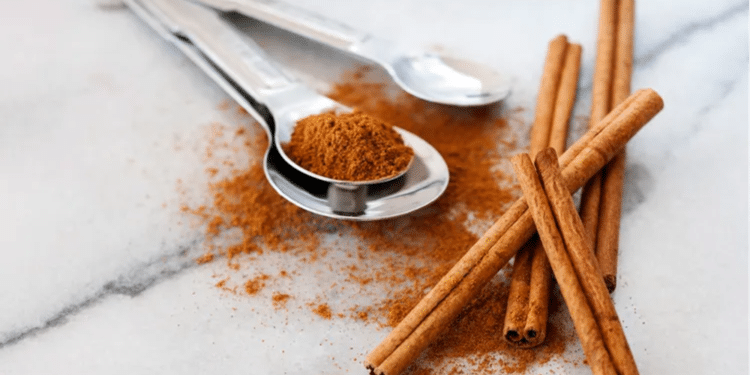Cinnamon is a spice made from certain types of trees. Extracts from the bark, leaves, flowers, fruits, and roots of the cinnamon tree have been used in traditional medicine worldwide for thousands of years. It’s used in cooking and baking and is added to many foods.
In traditional medicine, the spice has played a significant role. In Ayurveda, the ancient Indian system of medicine, it was utilized for its warming properties to enhance digestion and treat respiratory ailments. Similarly, in Traditional Chinese Medicine (TCM), cinnamon was employed to improve blood circulation and alleviate pain. These traditional uses underscore the long-standing recognition of cinnamon’s potential health benefits.
The culinary uses of cinnamon are equally diverse. It features prominently in both sweet and savoury dishes around the world. From the spiced desserts of Western cuisines, such as cinnamon rolls and apple pie, to the savoury stews and curries of Middle Eastern and South Asian cuisines, cinnamon’s versatility is remarkable.
There are four major types of cinnamon. Darker-colored cassia cinnamon is the one most commonly sold in the United States. It’s grown in southeastern Asia. Ceylon cinnamon, or true cinnamon, is frequently used in other countries.
The spice you buy at the store could be one of the two main types, Ceylon or cassia, or a mixture of both. Ceylon is easier to grind, but it may not have the same health benefits.
Cinnamon does have antioxidant, antibiotic, and anti-inflammatory properties, but for now, there aren’t enough studies to prove it works that well in people.
One of the most important active ingredients in cinnamon is cinnamaldehyde. It’s used in flavourings and fragrances. It may be responsible for some of cinnamon’s possible health benefits.
Some research shows cinnamon may be good for people with diabetes. A review of 18 studies suggests that cinnamon might lower blood sugar. However, it didn’t affect haemoglobin A1c, which is a sign of blood sugar levels over time. It may also lower cholesterol in people with diabetes. Many of the studies don’t say what type of cinnamon was used or have other problems that make their findings uncertain. One review suggests the benefits of cinnamon for weight loss and obesity. It’s sometimes used for irritable bowel syndrome or other stomach or intestinal problems. But it isn’t clear that it works.
Cinnamon contains potassium, magnesium, and calcium. Potassium helps to counteract sodium’s effect on blood pressure and controls the heart rate. Potassium is also involved in nerve function.
Magnesium and calcium work together to maintain a healthy heartbeat. These two minerals are essential for skeletal health, preventing the weakening of bones, a condition called osteoporosis.
In addition, cinnamon can provide other health benefits, like:
Anti-inflammation: Cinnamon is an effective anti-inflammatory. Researchers tested the phytochemicals found in cinnamon and discovered antioxidant and anti-inflammatory effects. In one study, certain cinnamon compounds also targeted free radicals with promising results.
Cancer prevention: Angiogenesis is the formation of new blood vessels to feed tumours. One of the keys to treating cancer is to stop angiogenesis. A study showed that cinnamon can slow down or hold off angiogenesis, cell growth, and cellular signalling. This suggests that cinnamon could be a tool in preventing or treating cancer.
Antibiotic properties: The compound cinnamaldehyde is responsible for cinnamon’s distinct odour and flavour. This phytochemical also has proven widespread antibiotic effects. Cinnamaldehyde was tested against several bacteria and viruses, including staphylococcus, E. coli, salmonella, and candida. Researchers found that it was able to prevent these bacteria from growing.
Protection from oxidative stress: Cinnamon has a ton of antioxidants, like polyphenols. These can help your body avoid oxidative damage. The antioxidants in cinnamon are so strong that it can sometimes be used as a natural food preservative.
Experts have seen that taking cinnamon supplements can boost antioxidant levels in your blood as well as lower inflammation markers.
Heart disease prevention: Cinnamon could lower your triglycerides and your total cholesterol levels, which could help prevent heart disease. If you take supplements with at least 1.5 grams of cinnamon a day, it may lower your total cholesterol, LDL (or bad) cholesterol, triglycerides, and blood sugar if you have metabolic disease.
It may also lower blood pressure if you consistently take it for 7 weeks.
Cinnamon also might help with:
However, studies are limited or have only been done in cells or animals.
Getting normal amounts of cinnamon isn’t likely to have a big impact on your health. It’s not a good idea to eat a lot of it, either.
Because cinnamon is unproven as a treatment, there isn’t a set dose. Some experts suggest consuming 1/2 to 1 teaspoon (2-4 grams) of powder a day. Some studies have used between 1 gram and 6 grams of cinnamon. High doses might be toxic.










